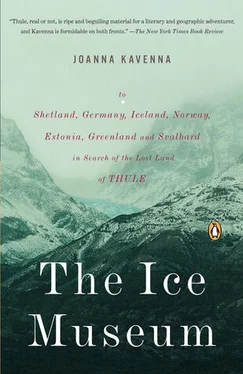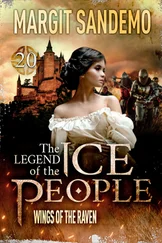‘I went to the university in the south of Estonia,’ Meri said. He straightened his tie, stood, and walked to the window. ‘And I had to look after myself, so I went to the market. And I remember the marketplace with all the apples, and sausages, and fishes and meats and autumn flowers. Smelling in different ways. And the people were selling their products, the women offering small pieces of the sausages, to taste—it was all quite wonderful to me,’ he said, smiling. ‘A year later, nothing was left. When the collectivisation began, the village people were deported to Siberia, and soon after almost all of the villages were forced into the collectivized farms. All the profits went to Russia. This increased the resistance movement considerably. There were those who did not want to become collectivized and they went into the forests and joined up with others who felt the same. There was real hunger, only a year after the forcible collectivization of the farms. There was not enough bread,’ he said, shaking his head in the twilight of the room.
‘You know,’ said the president, ‘there were different periods of Soviet terror. A person could make a good political career in Stalin’s time if he sent as many people as possible to Siberia, if he shot them in closed rooms. But in the 1960s, there was something of a break, and the Soviets realized that if you wanted sausages or fresh fish, then you had to have good relations with the local people. From this time on, they made more effort with the local people. Some local people were quite happy with this armistice. Others tried to push at the restrictions, to see what would shift.’
‘It must have been difficult,’ I said, blandly, and Meri nodded politely.
‘I am very happy that I was born when I was born,’ he said. ‘In the last decade of the twentieth century I was able to see what a national movement could do, even under Soviet terror. We hated the Soviet way of command economy, the pollution, the destruction of our soil. Fighting for a pure Estonia became more the beginning of a fight against Soviet occupation. It had quite a lot of political after-effects. Speaking about the use of the land, about who had the power to decide how it was used, this meant speaking about independence. And we gained independence.’
Meri had been one of the survivors; he had always been a writer, but his work was too scholarly for the Soviets, he said. They never read it; they thought it was obscure and pedantic. During the Soviet era, he had written on ancient tribes, on the small settlements scattered across the Siberian wilderness, he had written novels and plays; he had made documentaries. He did anything, he said, so that he could carry on. There were subtle hints which could be inserted into scholarship, small nods to the Estonian people, and Thule was part of this insinuation. Like a code word. It was the gaps contained in the word “Thule,” the silences which had intrigued the Victorians, which had seemed like a challenge to the explorers, which had been corrupted by the Thule Society members. The gaps and ambiguities allowed Meri to think of writing about Thule.
‘I have so many books on the theme, so many books still to read, and there is not so much time. What I know already is this: Pytheas is regarded as the first professional explorer,’ said Meri, into the gloom, ‘and Pytheas wanted to explore the northern part of Europe. There is no doubt that he was in England, because Cornwall was the main source of tin, at this time, so he was certain to have gone there. But my interest is a little different. Let me start like this: we know that some meteorites reach the earth from time to time. There is a huge and beautiful lake in North Finland, from such a landing we believe. All those huge craters were made long before human life began. Thanks to some Soviet researchers, I became aware a while ago that the island of Saaremaa was an exception.’
A meteorite landed on the island of Saaremaa, which lies off the Estonian coast. For a long time nobody knew when it had hit the ground. There was a great crater left in the earth, which had filled up with water.
‘Saaremaa,’ Meri added, ‘is a very beautiful place, you should visit if you can. The Soviet researchers were not interested in giving an exact date for the landing of the meteorite; they were much more interested in trying to evaluate what traces an explosion of such force might have left on the soil. But when they got the results, they seemed to show that the explosion happened seven hundred years before Christ. I was forced to ask myself whether there are any symptoms in the collective consciousness of Estonians from the event still living on into our time. In the Bronze Age, something which fell with the force of the Hiroshima bomb, well you would think this would have a deep abiding effect on the way of thinking or the way of understanding the world. A meteorite approaching the earth would be moving like a super sound wave, and this would mean that on its way it would be first heard after it had passed. It was something very bright—let’s say, like sunshine, and you could see this from a very far distance away—as far even as seven hundred kilometres, let’s say.’
A blinding light which looked like the sun, and then a great boom, as the meteorite carved out a great hole in the earth. The president was staring carefully at me. He stretched out his hands, to suggest distance. He said:
‘The very simple thought crossed my mind. When the meteorite landed on Saaremaa, it was something that could be compared by the Germans to the setting down of the sun. Seen from certain areas, from the Swedish coast maybe, it was the sun setting in the east. That is so very unnatural that it must have had a very strong influence on the ancient Swedish and German myths about the end of the world—the end of the gods. In thinking about these old times, one always has a small political spark in one’s mind, and the thought that Götterdämmerung , the myth about the death of the gods, had its origin here on this small Estonian island gave me a lot to laugh about, when I thought of those bombastic last days in Berlin, after Hitler had shot himself and they played Wagner on all the radio stations.’
He was speeding up; the silence was retreating, wafted back through the door, into the neat library. Meri lifted his head. He was declaiming this last part, making an effort, trying to push his theory out. ‘This was something that consoled me,’ he said. ‘I thought about Pytheas, the first great explorer, moving towards the east, perhaps arriving in the region where the tradition of the meteorite was known. It was interesting,’ he said, smiling, ‘in the descriptions of Pytheas’s voyage there was a phrase, “the barbarians showed him the place where the sun went to rest.” And people had always thought this meant the sun, that the barbarians showed Pytheas where the sun set.
‘But I suddenly thought it might be the terrifying event, the sun falling to the earth, the meteorite, a burning disc like the sun, crashing into the island of Saaremaa. According to your Oxford dictionary, the words “Ultima Thule” can be explained only partly. Ultima is understandable, but Thule—your dictionary says it is a word of unknown origin. But tuli in Estonian means “fire.” ’
He smiled in the semi-light.
‘You may be shocked,’ he said, ‘because I know that Tacitus said that Britain was Thule. The very idea that Ultima Thule might be Estonia would be appalling to every English person, I fear, and it will be more appalling to every Norwegian. It was, I believe, Nansen who placed Thule not far from Bergen.’
In the dark room, the president smiled at his small victory against the elusiveness of the sources, the strangeness of the history of his country. Outside, the land stretched to the dark sea, and everything was cloaked in dusk. The dog was barking loudly at the quietness, and there was a shuffling sound by the door, as a man stuck his head into the room.
Читать дальше












